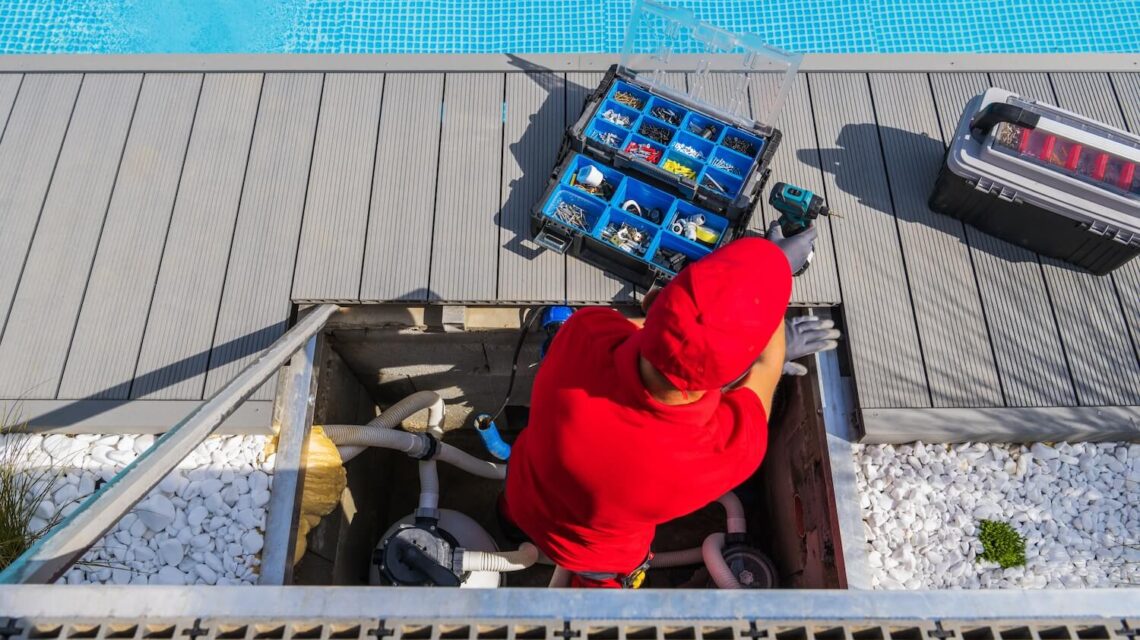Owning a swimming pool is often considered a dream come true for many homeowners. It offers a private oasis to escape the summer heat, a gathering place for family and friends, and an attractive feature that can enhance your property’s value. However, this dream comes with responsibilities, including routine maintenance and the inevitable repairs that may arise over time. When faced with pool issues, you may find yourself at a crossroads: should you attempt to tackle the repairs yourself or call in a professional? This article delves into the pros and cons of DIY pool repairs versus hiring experts, offering guidance on when to seek professional assistance.
Understanding Common Pool Problems
Before diving into the DIY vs. professional debate, it’s crucial to identify some common pool problems. This knowledge not only helps you understand the potential issues your pool may face but also enables you to assess the complexity of the repairs needed.
1. Leaks
Leaks are one of the most prevalent issues pool owners encounter. They can occur in various locations, including:
- Pool Shell: Cracks in the pool shell can lead to significant water loss. These leaks are often challenging to locate and may require specialized equipment to detect.
- Plumbing Lines: Broken or damaged plumbing lines can result in leaks that are hidden from view, often leading to significant water loss and structural damage.
- Equipment: Equipment leaks can stem from faulty seals, loose fittings, or worn-out components. Identifying and fixing these leaks promptly is crucial for maintaining proper water levels and preventing additional damage.
Not only can leaks lead to wasted water, but they can also result in significant damage to your property and increase your water bill if left unaddressed.
2. Cracks and Surface Damage
Over time, pool surfaces may develop cracks due to factors such as:
- Settling: As soil beneath the pool shifts, it can create stress on the pool structure, leading to cracks.
- Freeze-Thaw Cycles: In colder climates, water that seeps into cracks can freeze and expand, worsening the damage.
- Improper Installation: A poorly installed pool is more likely to suffer from surface damage over time.
Surface damage can lead to more significant problems, including leaks and algae growth, making prompt repairs essential.
3. Equipment Malfunctions
Pool equipment is vital for keeping your pool clean, safe, and functional. Common equipment issues include:
- Pumps: A malfunctioning pump can lead to inadequate water circulation, resulting in stagnant water and increased algae growth.
- Filters: Dirty or damaged filters can affect water clarity and sanitation, making it essential to address these issues quickly.
- Heaters: If your pool heater isn’t working properly, it can lead to uncomfortable swimming temperatures, especially during cooler months.
Recognizing the signs of equipment issues—such as unusual noises, poor water circulation, or inadequate heating—allows for timely intervention.
4. Tile and Grout Issues
Over time, pool tiles and grout may degrade, leading to:
- Stains: Mineral buildup can create unsightly stains on tiles.
- Cracked or Missing Tiles: Damaged tiles not only affect the pool’s appearance but can also create hazards for swimmers.
- Water Loss: Worn grout can allow water to seep through, leading to further damage.
Repairing or replacing tiles often requires specialized skills to ensure a seamless look and prevent further issues.
5. Algae Growth
Algae blooms are common in poorly maintained pools and can pose health risks. Factors that contribute to algae growth include:
- Poor Water Chemistry: Imbalanced water chemistry can create an environment conducive to algae growth.
- Inadequate Filtration: If your pool’s filtration system isn’t working properly, it can lead to stagnant water, promoting algae blooms.
- Insufficient Cleaning: Regular cleaning is necessary to prevent organic debris from accumulating and feeding algae.
While chemical treatments can help manage algae, identifying the root cause—such as filtration issues—may require professional insight.
DIY Pool Repair: Pros and Cons
Many homeowners opt for DIY repairs as a means of saving money and taking pride in maintaining their property. However, while there are advantages, there are also significant risks associated with DIY pool repairs.
Pros of DIY Repairs
- Cost Savings: One of the most significant advantages of DIY repairs is the potential for cost savings. By handling repairs yourself, you avoid labor costs associated with hiring a professional. For minor issues, this can be a wise financial decision.
- Learning Experience: DIY repairs can provide valuable learning opportunities, allowing homeowners to understand their pool systems better. This knowledge can be beneficial for future maintenance and repairs, empowering homeowners to take a more proactive approach to pool care.
- Flexibility: DIY projects can be completed at your own pace and on your schedule. If you have the time and motivation, this can be a significant advantage, especially for smaller, less complex repairs.
- Personal Satisfaction: Completing a DIY project can provide a sense of accomplishment and pride in homeownership. The satisfaction of knowing you’ve fixed something yourself can be rewarding.
Cons of DIY Repairs
- Lack of Expertise: While many pool repairs may seem straightforward, some issues require specialized knowledge and experience. Inadequate repairs can lead to more extensive damage, costing you more in the long run. Without the right expertise, it can be easy to overlook underlying issues that could worsen over time.
- Time-Consuming: DIY repairs often take longer than anticipated, particularly for those unfamiliar with pool systems. What seems like a simple fix can quickly turn into a time-consuming project, leading to increased downtime for your pool, which can be frustrating during peak swimming season.
- Risk of Mistakes: Mistakes during repairs can have severe consequences. For example, improperly sealing a leak can lead to more significant structural damage, or using the wrong chemicals can compromise water quality. These errors can be costly to rectify and may even create safety hazards.
- Safety Concerns: Working on pool equipment and plumbing can pose safety risks, particularly if you are not experienced with electrical systems or heavy machinery. Pool repairs may involve handling chemicals, working with electricity, or lifting heavy equipment, which can be dangerous without proper training.
- Limited Warranty Protection: DIY repairs may not come with any warranty or guarantee. If something goes wrong after your repair, you might find yourself spending additional money to fix the problem properly.
When to Call a Pool Professional
While DIY repairs can be suitable for minor issues, there are specific scenarios where hiring a professional is the best course of action. Recognizing these situations can save you time, money, and frustration.
1. Complex Repairs
For complex repairs, such as significant leaks, extensive surface damage, or major equipment failures, hiring a professional is often necessary. Pool professionals possess the expertise and tools to accurately diagnose and resolve these issues, minimizing the risk of further damage. They can quickly assess the problem and determine the best course of action, ensuring that repairs are done correctly.
2. Time Constraints
If you have a busy schedule and limited time for repairs, it may be wise to hire a professional. Professionals can often complete repairs quickly and efficiently, allowing you to return to enjoying your pool without prolonged downtime. This is especially important during peak swimming season when you want your pool to be operational as soon as possible.
3. Warranty and Insurance Considerations
If your pool is under warranty or you have insurance coverage for certain repairs, it’s essential to follow the correct procedures. DIY repairs could void warranties or complicate insurance claims. Hiring a professional ensures that the work is documented and completed according to industry standards, protecting your investment.
4. Specialized Knowledge
Some repairs may require specialized knowledge or certifications, particularly regarding electrical systems, plumbing, or chemicals. Professionals are trained to handle these aspects safely and effectively, ensuring compliance with local regulations and safety standards.
5. Consistency and Quality
Professionals bring a level of consistency and quality to their work that is challenging to replicate as a DIYer. They understand the nuances of pool systems and can ensure that repairs meet industry standards, providing peace of mind. Additionally, professionals often have access to higher-quality materials and tools, further enhancing the durability and effectiveness of their repairs.
6. Avoiding Future Problems
A professional can not only address the current issue but also identify potential problems that may arise in the future. Their experience allows them to see the bigger picture and provide preventative maintenance tips, ensuring your pool remains in excellent condition for years to come.
How to Choose the Right Pool Repair Professional
If you decide that hiring a professional is the best option, it’s essential to choose the right contractor for the job. Here are some tips to help you find a reputable pool repair service:
1. Research and Reviews
Start by researching local pool repair companies. Look for reviews on platforms like Google, Yelp, or social media. Positive feedback from past clients can give you confidence in your choice. Pay attention to the details in reviews, such as the responsiveness of the company, the quality of their work, and their customer service.
2. Verify Credentials
Check the credentials of any pool repair professional you are considering hiring. Ensure they are licensed, insured, and certified to perform the necessary repairs. This not only protects you but also ensures that the technician has the necessary skills and knowledge. A reputable contractor will have no problem providing this information.
3. Request Quotes
Don’t hesitate to ask for quotes from multiple professionals. This will give you an idea of the average cost for your specific repair. Be wary of unusually low quotes, as they may indicate a lack of quality or hidden fees. A detailed quote should outline the scope of work, materials needed, and expected timeline.
4. Ask About Experience
Inquire about the contractor’s experience, particularly with the specific issues you’re facing. A contractor with extensive experience in your type of pool and the problems you’re encountering is more likely to provide effective solutions.
5. Get Recommendations
Ask friends, family, or neighbors for recommendations if they’ve had positive experiences with pool repair professionals. Personal referrals can lead you to reliable contractors who have already proven their capabilities.
6. Evaluate Communication
Effective communication is essential when working with a contractor. Ensure they are responsive to your inquiries, take the time to explain the repairs needed, and provide clear answers to your questions. Good communication can prevent misunderstandings and ensure that the repair process goes smoothly.
Professional Pool Maintenance and Repair Or DIY Conclusion
Owning a swimming pool is a rewarding experience, but it comes with its share of responsibilities. When faced with repairs, understanding the pros and cons of DIY versus professional services is essential for maintaining your pool effectively. While DIY repairs may be suitable for minor issues, complex repairs or those requiring specialized knowledge should be left to the professionals.
By recognizing when to call the experts, you can ensure that your pool remains a safe and enjoyable space for you and your family. Ultimately, investing in professional pool repair can save you time, money, and stress, allowing you to focus on what truly matters—making memories in your beautiful pool. Whether you choose to tackle repairs yourself or hire a professional, prioritizing maintenance will ensure your swimming pool remains a source of joy for years to come.




